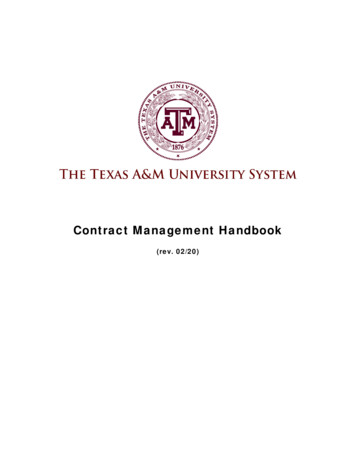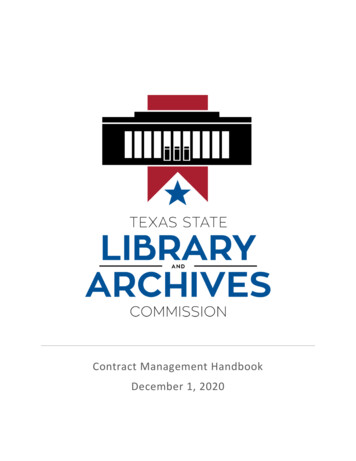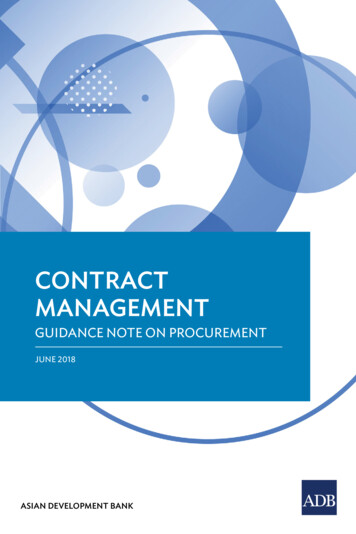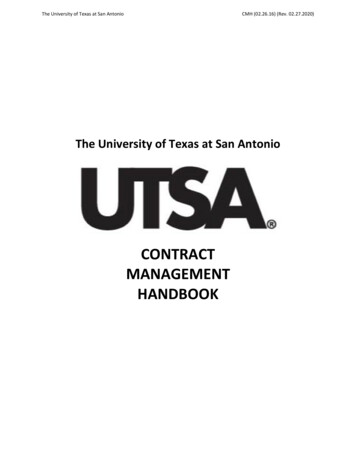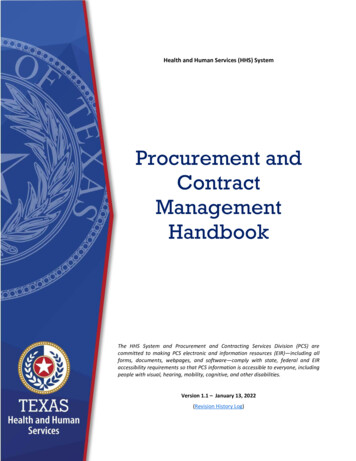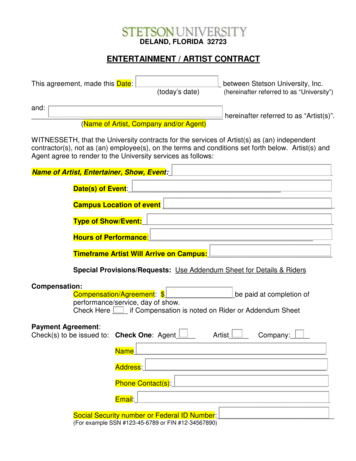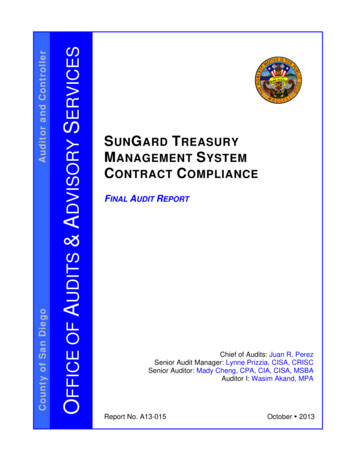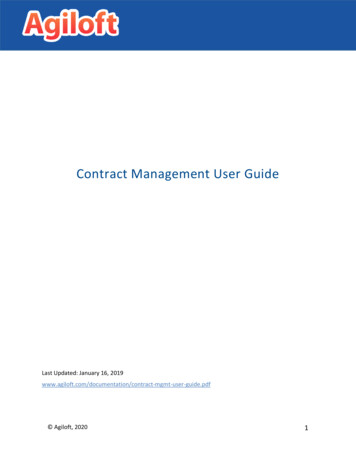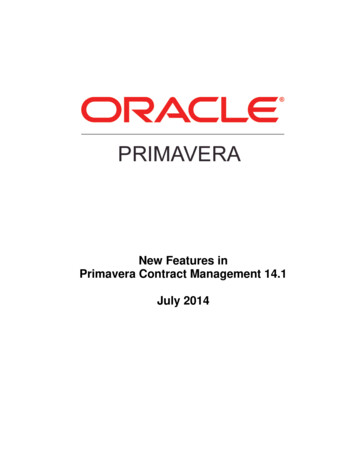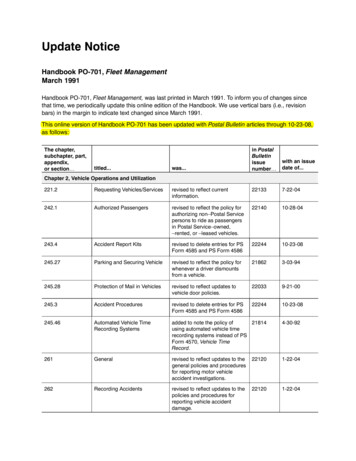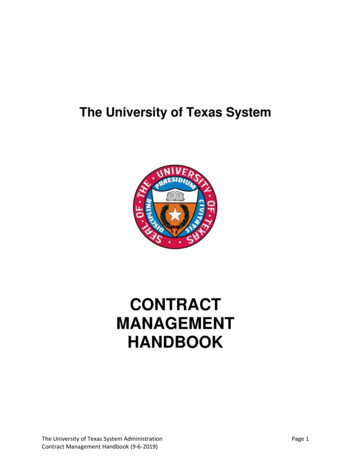
Transcription
The University of Texas SystemCONTRACTMANAGEMENTHANDBOOKThe University of Texas System AdministrationContract Management Handbook (9-6-2019)Page 1
TABLE OF CONTENTSChapter 1Introduction . 41.1 Purpose . 41.2 Definitions . 61.3 Acronyms . 111.4 Training for Purchasing Personnel and Contract Managers . 121.5 Ethics Standards and Policies . 131.6 Conflict of Interest . 151.7 New Ethics Requirements from Senate Bill 20 (2015) . 171.8 Disclosure of Interested Parties . 19Chapter 2Planning . 212.1 Contract Management Team . 222.2 Communications Plan. 242.3 Determining Competitive Procurement Method . 252.4 Planning for Contract Content . 342.5 Information Security; Access to Electronic and Information Resources422.6 Record Retention . 43Chapter 3Preparing the Solicitation . 443.1 Historically Underutilized Business (HUB) Requirements . 453.2 Contract Term . 463.3 Background Information . 473.4 Proposal Submission Requirements . 483.5 Evaluation of Proposals . 493.6 Solicitation Requirements . 523.7 Payment Types . 58Chapter 4Publication of the Solicitation . 614.1 Advertising . 614.2 Solicitation Announcements . 624.3 Communication with Respondents. 634.4 Written Questions. 644.5 Pre-Proposal Conferences . 654.6 Solicitation Submission and Opening. 67Chapter 5Evaluation and Award . 685.1 Evaluation Guide . 685.2 Evaluation Team . 695.3 Scoring Matrix . 705.4 Responsive Proposals . 715.5 Evaluation Team(s) Training . 725.6 Single Responses . 735.7 Proposal Evaluation . 745.8 References . 755.9 Oral Presentations/Discussions . 765.10 Best and Final Offers . 775.11 Negotiations . 785.12 Award . 80Chapter 6Contract Formation . 816.1 Approach to Contract Formation . 826.2 Legal Elements of a Contract . 836.3 Drafting the Contract . 856.4 Planning for Contract Preparation . 866.5 Form of the Contract . 87The University of Texas System AdministrationContract Management Handbook (9-6-2019)Page 2
6.66.76.86.96.10Chapter 7Contract Terms . 88State Contracting Standards/Oversight . 90Authority to Sign Contracts . 92Required Check of Vendor Hold Status . 95Execution of Institution Contracts . 96Contract Administration. 977.1 Planning . 987.2 Performance Monitoring . 1057.3 Contract Reporting Obligations . 1107.4 Invoices and Payments . 1117.5 Change Management Process. 1127.6 Dispute Resolution Process . 1157.7 Termination . 1167.8 Contract Close-Out . 119Version History. 120APPENDICESAPPENDIX 1Contract Management Best Practices MatrixAPPENDIX 2Summary of 2015 Procurement and Contracting LegislationAPPENDIX 3Sample Executive Approval MemoAPPENDIX 4Summary of UT Procurement GuidelinesAPPENDIX 5Exclusive Acquisition Justification FormAPPENDIX 6Sample Non-Disclosure StatementAPPENDIX 7Sample Solicitation AnnouncementAPPENDIX 8Sample Pre-Proposal Conference GuidelinesAPPENDIX 9Sample Proposal Score SheetAPPENDIX 10Sample Administrative Review ChecklistAPPENDIX 11Evaluation Team Guidelines and Purchasing Office ResponsibilitiesAPPENDIX 12Sample Evaluation Team Written InstructionsAPPENDIX 13Sample Reference Check FormAPPENDIX 14Sample Best Value Award JustificationAPPENDIX 15Sample Contract TermsAPPENDIX 16Sample Contract Monitoring WorksheetAPPENDIX 17Sample Contract Close-Out ChecklistAPPENDIX 18Group Purchasing Organization (GPO) Contract Submittal FormThe University of Texas System AdministrationContract Management Handbook (9-6-2019)Page 3
CHAPTER 1INTRODUCTION1.1PurposeThe purpose of this Contract Management Handbook (Handbook) is to offer contract managers,purchasing personnel and other administrators at University of Texas institutions recommendations ondocumenting existing contract management processes and practices in connection with the procurementof goods/services.This Handbook does not govern real estate transaction contracts (even if the transaction is a lease underwhich an Institution provides services in exchange for compensation), sponsorship agreements underwhich Institutions receive compensation is exchange for recognition of the sponsor, sponsored researchcontracts or other intellectual property agreements where Institutions convey an interest in intellectualproperty. Construction contracts are governed by separate statutory requirements and are also notaddressed in this Handbook. However, this Handbook may provide helpful information useful inconnection with contracts that are not governed by the Handbook.Use of this Handbook does not relieve Institutions and contractors of their responsibility to comply withApplicable Laws and University Rules related to specific programs and funding sources.For purposes of this Handbook, contract management includes the coordination and administration offour core processes: Planning;Procurement of goods or services (including complying with HUB laws and policies);Contract Formation (including scope of work, specification of contract price or rate and otherrelevant terms and conditions); andContract Administration.The nature and level of risk associated with each of these contract management elements varydepending on the type of contract and the business relationship between the Institution and contractor. Itis the responsibility of the chief business officer of each Institution to assign responsibilities, assureappropriate training and oversight, and monitor the processes so that each procurement achieves bestvalue for the Institution.Fully implemented contract management requires coordinating and administering the four coreprocesses. However, contract management also involves coordination of a variety of distinctdisciplines and roles, including: Executive Management;Project Management;Planning;Program Staff (subject matter experts and monitors);Contractor Interaction;Purchasers;Accounting and Budget;Legal;Audit; andQuality Control/Assurance.The contract manager or lead for the contract management team assigned to any particular contract isresponsible for assuring that all necessary and appropriate disciplines are engaged and their work withrespect to the contract coordinated to assure compliance with this Handbook, including meeting legalcontract requirements. Various types of contracts are subject to different statutory standards, practices,The University of Texas System AdministrationContract Management Handbook (9-6-2019)Page 4
processes, and strategies for successful implementation. The suggestions, comments, techniques,examples and recommendations included in this Handbook are not appropriate for every type ofcontract.This Handbook: Summarizes certain mandatory statutory, regulatory and policy compliance requirements related toInstitution contracting activities that are evidenced by Handbook references to the applicablestatute, regulation, or policy. Provides practical suggestions and best practices related to Institution contracting activities whichare encouraged but not mandatory. Taking into consideration the complexity of the contract onwhich the Institution is working, Institutions should exercise reasonable business judgment whenapplying practical suggestions and best practices. Recognizing that the needs of each Institutionand the requirements of each contract are different, the information in this Handbook is intended tobe applied flexibly, not mechanically. This Handbook provides a framework for making contractingdecisions that are in the best interest of the Institution. Provides a Contract Management Best Practices Matrix attached as APPENDIX 1 that includes asummary of best practices designed to help Institutions determine where a contract managementprogram currently stands in relation to generally accepted contract management best practices.This matrix offers a number of best practices in several key contract management areas and maybe used to improve practices and to implement the best contract management program possible.The matrix is intended to assist Institutions with organizing contract management programs andleveraging technology, metrics, training and lessons learned for the purpose of minimizing risksthroughout the overall supply chain. The matrix also includes a reference section that points to theapplicable Chapters of this Handbook related to each contract management component. Describes the duties of t h e contract management team, including how to solicit and select acontractor, develop and negotiate a contract, and monitor contractor and subcontractorperformance. Supplements (but does not replace) Applicable Laws and University Rules. Each Institution isindependently responsible for developing sound business policies and procedures in accordancewith Applicable Laws and University Rules. Discusses many general legal principles; however, these general principles include manyexceptions. This Handbook Is not intended to be a manual on the law of contracts or constitutelegal advice. Contract managers should consult with the Institution’s legal office with regard to anylegal questions that arise with respect to contracts. Includes model contract provisions and indicates whether each provision is essential orrecommended. Addresses the permitted extent of contract changes that may be made before a new competitivesolicitation may be needed. Suggests time frames for the solicitation, evaluation, negotiation and awarding of a major contract. Establishes the procedure for attempting to determine why a single response was received in replyto a procurement solicitation.This Handbook does not constitute specific legal advice on any particular issue that may arise. Feelfree to consult with appropriate legal advisors as necessary.Where can I go for more information?APPENDIX 1 – Contract Management Best Practices MatrixThe University of Texas System AdministrationContract Management Handbook (9-6-2019)Page 5
1.2DefinitionsAddendum: An addition, change, or supplement to a solicitation issued prior to the opening date.Advertise: A public announcement of the intention to purchase goods/services.Amend or Amended: Status change to an RFP, IFB, RFI, RFQ or contract that indicates a modificationto that document.Amendment: Written addition or change to a contract, including modifications, renewals andextensions.Applicable Laws: All applicable federal, state or local, laws, statutes, regulations, ordinances andorders.Assignment: Transfer of contractual rights from one party to another party.Best Value: Factors to be considered in determining best value in making certain purchases ofgoods/services (ref. Texas Education Code, §§51.9335 (all Institutions except UTMDACC), 73.115(UTMDACC) and 74.008 (UTMB), each subject to Texas Education Code, §51.9337).Best Value Invitation for Bids (IFB): Best value procurement process used when the requirementsare clearly defined, negotiations are not necessary and price is the primary determining factor forselection (also known as best value Invitation to Bid or ITB). The mandatory evaluation criteria thatmust be used to evaluate bids are specified by the Best Value Statutes.Best Value Statutes: The laws that authorize Institutions to use the specified best value procurementprocedures for goods/services, but not professional services. (ref. Texas Education Code, §§ 51.9335(all Institutions except UTMDACC), 73.115 (UTMDACC) and 74.008 (UTMB), each subject to TexasEducation Code, §51.9337).Bid: An offer to contract with the state, submitted in response to an invitation for bids (IFB). Bids areusually non-negotiable.Bidder: An individual or entity that submits a bid. The term includes anyone acting on behalf of theindividual or other entity that submits a bid, such as agents, employees and representatives (seeProposer and Respondent).Biennium: The two (2) year period in which the Texas Legislature appropriates funds. The bienniumbegins on September 1st of odd numbered years.Board of Regents: The Board of Regents of The University of Texas System.Bond: Note or other form of evidence of obligation issued in temporary or definitive form, including anote issued in anticipation of the issuance of a bond and renewal note.Business Entity: An entity (other than a governmental entity or state agency) through which businessis conducted with an Institution, regardless of whether the entity is a for-profit or nonprofit entity.Certificate of Filing: The disclosure acknowledgement issued by the Texas Ethics Commission to thefiling Business Entity.Competitive Sealed Proposals: Process of advertising a request for proposal (RFP), the evaluation ofsubmitted proposals and awarding of the contract.Consultant: A person that provides or proposes to provide a consulting service.Consulting Service: Practice of studying or advising a state agency under a contract that does notinvolve the traditional employer/employee relationship (ref. Texas Government Code, §2254.021The University of Texas System AdministrationContract Management Handbook (9-6-2019)Page 6
Definitions).Contract: An agreement (including a purchase order) where a contractor provides goods/services to anInstitution and the Institution pays for such goods/services in accordance with the established price,terms and conditions, as well as an agreement under which a contractor is given an opportunity toconduct a business enterprise on an Institution’s premises in exchange for compensation to theInstitution (i.e., auxiliary enterprise contracts).Contract Administration: This generally refers to the processes that occur after a contract is signedand is explained in detail in Chapter 7.Contract Advisory Team: The team created to assist state agencies in improving contractmanagement practices (ref. Texas Government Code, Chapter 2262 Statewide Contract Management,Subchapter C Contract Advisory Team).Contract Management: The entire contracting process from planning through contract administration,including contract close-out.Contract Manager: A person who is employed by an Institution and has significant contractmanagement duties for the Institution.Contractor (or Vendor): A business entity or individual that has a contract to provide goods/services toan Institution.Controlling Interest: (1) an ownership interest or participating interest in a Business Entity by virtue ofunits, percentage, shares, stock or otherwise that exceeds 10 percent; (2) membership on the board ofdirectors or other governing body of a Business Entity of which the board or other governing body iscomposed of not more than 10 members; or (3) service as an officer of a business entity that has 4 orfewer officers, or service as one of the 4 officers most highly compensated by a Business Entity thathas more than 4 officers.Deliverable: A unit or increment of work required by a contract, including such items as goods,services, reports, or documents.Electronic State Business Daily (ESBD): The electronic marketplace where State of Texas bidopportunities are posted (ref. Texas Government Code, §2155.083 State Business Daily; NoticeRegarding Procurements). Pursuant to Texas Government Code, §2155.083(n), IHEs to which TexasEducation Code, §§ 51.9335 or 73.115 apply are not subject to Texas Government Code, §2155.083.Emergency: A purchase made when an unforeseen and/or a sudden unexpected occurrence creates aclear and imminent danger, requiring immediate action to prevent or mitigate the loss or impairment oflife, health, property, or essential public services.Exclusive Acquisition: Purchase of goods/services that exceed the authorized direct procurementdollar threshold (typically 15,000 for Institutions) from a single vendor, without soliciting competitiveoffers or proposals. The term includes proprietary/sole source purchases.Executive Sponsor: A high-level individual with primary responsibility for implementation andoperation of the project. In some instances, the executive sponsor may be the executive head of theInstitution. In other instances, the executive sponsor may be the division or program director withoverall project responsibility.Financial Advisors or Service Providers: Persons or business entities who act as a financial advisor,financial consultant, money or investment manager, or broker.Goods: Supplies, material, or equipment, including a transportable article of trade or commerce thatcan be bartered or sold. Goods do not include construction services or real property.The University of Texas System AdministrationContract Management Handbook (9-6-2019)Page 7
Group Purchasing Organization (GPO): A purchasing program established by (1) a state agency thatis authorized by law to procure goods/services for other state agencies, such as the StatewideProcurement and Statewide Support Services Division of the Texas Comptroller of Public Accounts(SPSS) and the Texas Department of Information Resources (DIR), or any successor agencies,respectively; or (2) a group purchasing organization the Institution utilizes in accordance with theUT System GPO accreditation process, such as Novation, Premier, Western States ContractingAlliance, and U.S. Communities Government Purchasing Alliance; or (3) the UT System Supply ChainAlliance.Handbook: The University of Texas Contract Management Handbook.Historically Underutilized Business (HUB): A minority-owned, woman-owned or certain disabledveteran-owned businesses as defined by Texas Government Code, Title 10, Subtitle D, Chapter og/hub/).Institutions of Higher Education: Institutions of higher education as defined by Texas EducationCode, §61.003(8).Institution: UT System and the institutions comprising UT System as listed in Regents’ Rule 40601.Interested Party: (1) a person who has a Controlling Interest in a Business Entity with whom anInstitution contracts; or (2) a person who actively participates in facilitating the contract or negotiatingthe terms of the contract with the Institution, including a broker, intermediary, adviser, or attorney for theBusiness Entity.Intermediary: A person who actively participates in the facilitation of the contract or negotiating thecontract, including a broker, adviser, attorney, or representative of or agent for the Business Entity who:(1) Receives compensation from the Business Entity for the person’s participation;(2) Communicates directly with the Institution on behalf of the Business Entity regarding thecontract; and(3) Is not an employee of the Business Entity.Negotiations: A consensual bargaining process in which the parties attempt to reach agreement on adisputed or potentially disputed matter. In a contractual sense, negotiation means the “dealingsconducted between two or more parties for the purpose of reaching an understanding.”Payment Bond: A bond executed in connection with a contract which secures the paymentrequirements of contractor.Performance Bond: A surety bond that provides assurance of a contractor’s performance of a certaincontract. The amount for the performance bond is based on the value of the contract.Pre-proposal Conference: A meeting chaired by Institution personnel that is designed to help potentialbidders/proposers/respondents understand the requirements of a solicitation. Also known as a pre-bidconference.Professional Services: Services directly related to professional practices as defined by theProfessional Services Procurement Act (Texas Government Code, §2254.002). These include serviceswithin the scope of the practice of: accounting; architecture; optometry; medicine; land surveying; andprofessional engineering. Services provided by professionals outside the scope of their profession (forexample, management consulting services provided by accounting firms) are not consideredprofessional services. Contracted services provided by professionals that fall outside their scope ofpractice are governed by the Best Value Statutes applicable to the purchase of goods/services.Proposal: An executed offer submitted by a respondent in response to a Request for Proposals (RFP)and intended to be used as a basis to negotiate a contract award.Proposer: An entity submitting a proposal in response to a solicitation. The term includes anyoneacting on behalf of the individual or other entity that submits a proposal, such as agents, employeesand representatives (see Respondent).The University of Texas System AdministrationContract Management Handbook (9-6-2019)Page 8
Proprietary Purchase: (see Exclusive Acquisition)Purchasing Office: The office designated to purchase goods/services above the direct procurementdollar threshold for an Institution.Regents’ Rules: The Rules and Regulations of the Board of Regents of The University of TexasSystem.Renewal: Extension of the term of an existing contract for an additional time period in accordance withthe terms and conditions of the original or amended contract.Request for Information (RFI): A general invitation to contractors requesting information for apotential future competitive solicitation. The RFI is not a competitive solicitation and a contract may notbe awarded as the result of an RFI. An RFI is typically used as a research and information gatheringtool for preparation of a competitive solicitation.Request for Proposal (RFP): A solicitation requesting submittal of a proposal in response to therequired specifications and SOW and usually includes some form of a cost proposal. The RFP processallows for negotiations between a respondent and the Institution. The mandatory evaluation criteria thatmust be used to evaluate proposals are specified by the Best Value Statutes.Request for Qualifications (RFQ): A solicitation requesting submittal of qualifications or specializedexpertise in response to the scope of services required. No pricing is solicited with an RFQ.Responsive: A respondent or proposal that complies with all material aspects of the solicitation,including submission of all required documents.Respondent: An entity submitting a proposal in response to a solicitation. The term includes anyoneacting on behalf of the individual or other entity that submits a proposal, such as agents, employeesand representatives (see Proposer).Responsible: A respondent that is capable of fully performing and delivering goods/services inaccordance with the contract requirements. The Institution may include past performance, financialcapabilities and business management as criteria for determining if a respondent is capable ofsatisfying the contract requirements.Scope of Work (SOW): An accurate, complete, detailed, and concise description of the work to beperformed by the contractor.Service: The furnishing of skilled or unskilled labor by a contractor which may not include the deliveryof a tangible end product. In some cases, services and goods may be combined (such as filmprocessing). In these instances, Institutions should determine whether labor or goods is the primaryfactor. In the case of film processing, the labor to process the film is the primary factor, therefore filmprocessing is considered a service.Sole Source: (see Exclusive Acquisition)Solicitation: A document requesting submittal of bids, proposals, quotes or qualifications forgoods/services in accordance with the advertised specifications.Specification: Any description of the physical or functional characteristics or of the nature ofgoods/services to be purchased. It may include a description of any requirements for inspecting,testing, or preparing goods/services for delivery.State: The State of Texas.State Agency: An agency of the State of Texas as defined in Texas Government Code, §2056.001(excluding Institutions).The University of Texas System AdministrationContract Management Handbook (9-6-2019)Page 9
Statute: A law enacted by a legislature.Sub-recipient: A non-federal entity that expends federal awards received from a pass-through entity tocarry out a federal program, but does not include an individual that is a beneficiary of such a program. Asub-recipient may also be a recipient of other federal awards directly from a federal awarding agency.Surety: A person or entity providing a bond to a contractor to indemnify the Institution against all directand consequential damages suffered by failure of contractor to perform the contract and to pay alllawful claims of subcontractors, materials vendors and laborers as applicable.University Rules: The Regents’ Rules at http://www.utsystem.edu/board-of-regents/rules; the policiesof UT System at https://www.utsystem.edu/sites/policy-library; and the Institutional rules, regulationsand policies of the applicable Institutions.UT System: The University of Texas System.Vendor (or Contractor): A business entity or individual that has a contract to provide goods/services toan Institution.The University of Texas System AdministrationContract Management Handbook (9-6-2019)Page 10
1.3AcronymsBAFO: Best and Final OfferCPA:State of Texas Comptroller of Public AccountsDIR:State of Texas Department of Information ResourcesEIR:Electronic and Information ResourcesESBD: Electronic State Business DailyGPO:Group Purchasing OrganizationHSP:HUB Subcontracting PlanHUB:Historically Underutilized BusinessIFB:Best Value Invitation for Bid (also known as Invitation to Bid or ITB)IHE:Institution of Higher EducationIR:Information ResourcesLBB:Texas Legislative Budget BoardOGC: The University of Texas System Office of General CounselRFI:Request for InformationRFP:Request for ProposalRFQ:Request for QualificationsSAO:State of Texas Auditor’s OfficeSOW: Scope of WorkSPSS: Statewide Procurement and Statewide Support Services Division of the Texas Comptroller ofPublic
Sep 06, 2019 · The purpose of th Contract Management is Handbook (Handbook) is to offer contract managers, . An addition, change, or supplement to a solicitation issued prior to the opening date. Advertise: A public

